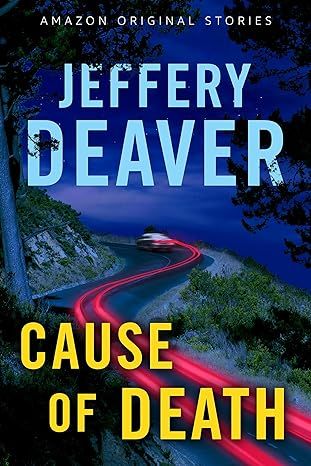Cause of Death
4.2
-
5,166 ratings
New York Times bestselling master of suspense Jeffery Deaver unveils the secrets of a marriage when a husband decides to investigate his wife’s death in this gripping short story.
Jon Talbot is a history professor who makes sense of the past by examining facts. He also knows how to speculate about the what-ifs. Jon’s doing both following the death of his wife, Pax. Driving home late from a volunteer assignment, she plunged off a mountain highway and died. The police find nothing suspicious about the facts: a deer in the road, a blown tire, a broken neck. But the what-ifs are leading Jon down a twisting trail of secrets. After five years of marriage, he is finally getting to know his wife.
Kindle
$0.00
or $1.99 to buy
Audiobook
$0.00
with membership trial
Ships from
Amazon.com
Payment
Secure transaction
Print length
91 pages
Language
English
Publisher
Amazon Original Stories
Publication date
July 28, 2021
Popular Highlights in this book
Her volunteering for Heart-in-Hand, which provided assistance for the disabled and elderly. It was upon returning from an assignment for this organization that she plunged off Route 420 on Palmer Mountain and died.
Highlighted by 44 Kindle readers
In a gray, pressed uniform, Deputy Terry Garner appears in the doorway and gestures for me to follow him.
Highlighted by 41 Kindle readers
Product details
ASIN :
B095YLVK7B
File size :
3983 KB
Text-to-speech :
Enabled
Screen reader :
Supported
Enhanced typesetting :
Enabled
X-Ray :
Enabled
Word wise :
Enabled
Editorial Reviews
Jeffery Deaver is a former journalist, folk singer, and attorney whose novels have appeared on bestseller lists around the world, including in the New York Times, the Times of London, Italy’s Corriere della Sera, the Sydney Morning Herald, and the Los Angeles Times. His books are sold in 150 countries and have been translated into twenty-five languages.
The author of more than forty novels, three collections of short stories, and a nonfiction law book, and the lyricist of a country-western album, he’s received or been short-listed for dozens of awards.
Deaver’s Lincoln Rhyme thriller The Broken Window was named best novel of the year by the International Thriller Writers (ITW). His stand-alone novels The Bodies Left Behind and Edge were also nominated for ITW prizes, as was his short story The Victims’ Club. He has been awarded the Ian Fleming Steel Dagger and the Short Story Dagger by the British Crime Writers’ Association, and he is a winner of the British Thumping Good Read Award and the Nero Award. The Cold Moon was named the book of the year by the Mystery Writers of Japan. In addition, the Japan Adventure Fiction Association gave The Cold Moon and Carte Blanche its annual Grand Prix award. Deaver’s book The Kill Room was awarded the Political Thriller of the Year award by Killer Nashville, and his collection of short stories Trouble in Mind was nominated for best anthology by that organization as well.
Deaver, who was named a Grand Master by Mystery Writers of America (MWA) in 2020, has been honored with the Lifetime Achievement Award of Bouchercon, the World Mystery Convention and with the Raymond Chandler Award for lifetime achievement in Italy. Strand Magazine also presented him with a Lifetime Achievement Award. Deaver has been nominated for an Anthony, a Shamus, and a Gumshoe, as well as for eight Edgar Awards from MWA. He served two terms as president of that prestigious organization.
His audiobook The Starling Project, starring Alfred Molina and produced by Audible, was a finalist for the Audie Award for Best Audio Drama of the year in 2016. Deaver contributed to the anthologies In the Company of Sherlock Holmes and Books to Die For, the latter of which won the Anthony and Agatha Awards.
Deaver’s most recent novels are The Final Twist, The Goodbye Man, and The Never Game in his Colter Shaw series; the Lincoln Rhyme novels The Cutting Edge, The Burial Hour, and The Steel Kiss; Solitude Creek, a Kathryn Dance thriller; and The October List, a thriller told in reverse. For the Kathryn Dance novel XO, Deaver wrote an album of country-western songs, available on iTunes and as a CD. Before that, he wrote Carte Blanche, a James Bond continuation novel and a #1 international bestseller. Deaver’s most recent short fiction includes The Debriefing; Turning Point; Captivated, which introduced Colter Shaw; and Buried, part of the Amazon Original Stories collection Hush.
Deaver’s book A Maiden’s Grave was made into an HBO movie starring James Garner and Marlee Matlin, and his novel The Bone Collector was a feature release from Universal Pictures starring Denzel Washington and Angelina Jolie. Deaver’s Lincoln Rhyme / Amelia Sachs novels were the basis for the nine-episode NBC TV show Lincoln Rhyme: Hunt for the Bone Collector. Lifetime aired an adaptation of his book The Devil’s Teardrop. And yes, the rumors are true: he did appear as a corrupt reporter on his favorite soap opera, As the World Turns. He was born outside Chicago and has a bachelor of journalism degree from the University of Missouri and a law degree from Fordham University.
Readers can visit his website at www.jefferydeaver.com.
Read more
Sample
1
Isit in a small room in the medical examiner’s office.
I am here to identify a body.
It’s a sterile place made no less sterile by plastic flowers in a plastic vase. Pink and white—the flowers. The vase is a form of gray.
The boxy chamber might have been a waiting room for a doctor with an obscure specialty and few patients. Four chairs, three of them matching.
I pick the odd one. It creaks as I sit.
I’m wearing what I wear most days, a plaid sport coat—today navy blue—and tan slacks. I place my hands on my knees.
A woman enters. She blinks. Perhaps she doesn’t see many people here who’re my age: thirty-three. I stare at her the way one might at an apparition, if one believed in apparitions, though she bears no resemblance to Pax. She is not with the medical staff but a grief counselor. The kindly woman sits and bends toward me, at just the right angle. She’s practiced this. She says many things, in a soft voice, eyes locked onto mine, whether I glance toward her or not. She gives me a card.
A man steps inside. He has gray hair, jowls. Plaid jacket too, though his is brown. His slacks are blue. One nail needs trimming and his watch, an OMEGA, is five minutes fast. He exudes staunch sympathy. He and the counselor share a nod. After giving me a firm handshake, the woman leaves.
The man identifies himself as the county medical examiner. After we sit, he assumes the same forward-leaning angle as the counselor. He withdraws two photographs from a file folder, asking me if they are of my wife, Patience Susan Addison. Here, in Martinsville County, Massachusetts, one doesn’t identify the corpse itself by looking at the body in a file cabinet tray, the way it works in TV crime shows and perhaps other jurisdictions.
The pictures are color printouts, four-by-fives. Maybe they’ve discovered that larger pictures are more likely to ignite hysteria.
I look at the heart-shaped face, her eyes closed, complexion understandably paler than when she was among the living. There are no scars or bruises. She died of a broken neck. A different camera angle would have revealed that, I know.
I regard a second photograph. The tattoo of a ginkgo leaf on her ankle.
“Yes. That’s her.”
And it’s completed. I ask if there are forms to fill out.
“No.”
“Am I supposed to take them?”
After a brief pause the ME says, “No, but if you want photos, I think the mortician can do something for you.”
I’d been referring to the plastic flowers.
I walk out into the fierce June sun. I climb into my white SUV and return home. In the kitchen I see two mugs in the dish drainer on the cluttered counter. One mine, one Pax’s. I take mine and make a cup of coffee with the Keurig machine. The flavor is hazelnut.
I sit at the table and see before me the pad of foolscap on which I’d been writing the afterword to a book I’ve nearly completed about the process of historical research. It will not be a Times bestseller, but quite a few professors and grad students can be counted on to buy the slim volume.
I read the words I was composing when the deputy called me, the sentences in careful script, blue ink on jaundiced paper.
We hear that history is written by the victors, but this isn’t the case. History is written by a vast population, honest and deceitful, enlightened and confused, informed and ignorant, who leave behind the whole cluttered bucket for others—historians, for instance—to pick through, select from and eventually assemble . . .
I look up from the passage and gaze out the window at the red-blooming camellias hugging the stained panes. I tuck the pad into a manila folder and lean back in the chair, eyes on the ceiling.
I have plans to make.
2
The funeral unfolds as funerals will. Somber, awkward and predictable.
Pax’s parents arrived from North Carolina, her sister from St. Louis. An only child, I have no close family in the area. My own mother and father died some years ago. An uncle—my father’s brother—and his wife and their sons flew in from California. I appreciate this. The service is well attended: friends, fellow professors of mine, colleagues from Pax’s endowment office—we worked for the same college. Seventy or eighty are present.
At the appointed time, a gentle, studiously solemn man closes the chapel’s double doors, shutting out the brilliant day. He nods the family to the front. We take our seats.
Reverend Phil does a fine job, considering that Pax and I were Christmas and Easter parishioners, and only then when Bob and Martha, her parents, were in town.
Then the eulogies. Janet and I planned the choreography. Her sister, three years younger, would offer anecdotes about Pax’s early days. I would deliver the more recent material.
Janet is clever and thoughtful and in control. And it’s just as well she took over Pax’s childhood and teens since what husband of five years retains—or ever knew—all the facts of the pre-spouse days? In Pax’s case, that was twenty-five years of details: thirty minus those that we were together.
There was much Pax hadn’t shared with me. She was quite an athlete, apparently. She fenced, competed in triathlons. She followed the Warren Miller approach to extreme skiing. “My sister told me you should never jump off a sixty-foot cliff, until you’ve mastered jumping off a forty-foot one.”
Drawing mild laughter and some tears.
And though I knew she had backpacked overseas after college, I learn only now that she’d been there for three whole years, making her living at the good deeds that became her profession and passion. When working for Food for Humanity on a stint in Central Africa, she’d faced down a warlord who was demanding rice for his soldiers. The man had regarded her stony gaze and retreated.
Pax Addison had quite the stony gaze.
Janet concluded with, “Charity work was her soul.”
Then my turn: How Patience became Pax (she had always liked the Latin for “peace”). Her boldly painting her office walls at home with comic book superheroes. The found dog we spent a month trying to return to its owner, a successful mission ultimately. Our sporadic hobby of refinishing antiques. Some disasters in the kitchen. A ski trip that ended in my visit to the ER, because I didn’t know there was a left ski and a right ski. Her unstoppable efforts to tap wealthy benefactors like trees at sap season and replenish the college’s bank account. Her volunteering for Heart-in-Hand, which provided assistance for the disabled and elderly.
It was upon returning from an assignment for this organization that she plunged off Route 420 on Palmer Mountain and died. A fact I do not, of course, share.
Janet wins the Toastmaster award, it appears, which I am pleased with. It’s fitting. And the attendees surely want to give me a participation prize, grateful for my not breaking down in uncomfortable sobs.
Neither Martha nor Bob, far more dazed than I, rise to speak. Friends and a coworker offer accounts.
A typical service.
Somber, awkward and predictable . . .
At Dover Hills Memorial Garden the reverend offers a few more words, and there’s a harpist that Martha arranged, though I have no idea why. Pax listened to classic oldies: Dylan and Joni Mitchell and Janis Joplin and Jimi Hendrix. If she had made her own funeral arrangements, she might have picked “Both Sides Now.” Or “Sad-Eyed Lady of the Lowlands”; she herself had eyes whose outer corners descended charmingly. And it would have been played on an electric hollow-body guitar.
But harpist it is. Pachelbel’s Canon, though? Couldn’t the frothy slip of a woman, obscured by the massive instrument, throw in at least a Mariah Carey or Lady Gaga, if she wasn’t inclined toward the sixties?
I feel a hand on my shoulder. It’s my graduate assistant, Brooke Hartford. The woman—a hunting, horse-riding cowgirl on the weekends—is in a stylish dress, not black but deep purple. I’ve never seen her in anything but embroidered jeans and Western shirts with pointed pockets, pearl buttons, bric-a-brac. She owns a number of cowboy hats. Today her mass of blond hair is crowned with a modest, respectful pillbox, similar to Pax’s mother’s. I press her hand in return. In a whisper she asks, “I’ll cancel your classes?”
“No. The distraction, you know.”
“Sure.”
She steps back.
And then it happens.
During a rendition of “Because All Men Are Brothers,” I glance over the heads of the mourners and see him.
A man in the woods.
He wears dark clothing, though not a suit. Black slacks, close fitting—they might have been jeans—and a charcoal-gray windbreaker-style jacket, the collar turned up. Aviator sunglasses shield his eyes—unnecessarily because the pine and oak cast him in dense shadow. His hair is light, probably blond, maybe salted with some gray. He is tall, over six feet, I estimate. Age? Forties, maybe. He isn’t exactly crouching but it’s clear he doesn’t want to be seen.
And he’s staring directly at me.
I am in sunglasses too, Ray-Bans, and can keep my face pointed at the harpist while watching him.
Then the funeral home director’s younger brother hands out roses to the family.
The casket lowers into the ground. In no particular order those of us with flowers step forward and release them onto the shiny mahogany.
I look again for the Man in Gray. I scan the grounds and spot him through the foliage. He is walking to a black sedan.
I nod at several mourners and thank them for coming, then walk up to Brooke.
“Changed my mind. Cancel classes for two days.”
I watch the Man in Gray pilot his car over the winding drives toward the graveyard’s exit.
“No, make it three.”
Read more
About the authors
Jeffery Deaver
Jeffery Deaver is an international number-one bestselling author. His novels have appeared on bestseller lists around the world. His books are sold in 150 countries and translated into over twenty-five languages. He has served two terms as president of Mystery Writers of America, and was recently named a Grand Master of MWA, whose ranks include Agatha Christie, Ellery Queen, Mary Higgins Clark and Walter Mosely.
The author of over forty novels, three collections of short stories and a nonfiction law book, and a lyricist of a country-western album, he’s received or been shortlisted for dozens of awards. His "The Bodies Left Behind" was named Novel of the Year by the International Thriller Writers association, and his Lincoln Rhyme thriller "The Broken Window" and a stand-alone, "Edge," were also nominated for that prize. "The Garden of Beasts" won the Steel Dagger from the Crime Writers Association in England. He’s also been nominated for eight Edgar Awards by the MWA.
Deaver has been honored with the Lifetime Achievement Award by the Bouchercon World Mystery Convention, the Strand Magazine’s Lifetime Achievement Award and the Raymond Chandler Lifetime Achievement Award in Italy.
His book "A Maiden’s Grave" was made into an HBO movie starring James Garner and Marlee Matlin, and his novel "The Bone Collector" was a feature release from Universal Pictures, starring Denzel Washington and Angelina Jolie. Lifetime aired an adaptation of his "The Devil’s Teardrop." NBC television recently aired the nine-episode prime-time series, "Lincoln Rhyme: Hunt for the Bone Collector."
You can find out more about Jeffery on his website www.jefferydeaver.com, Facebook page facebook.com/JefferyDeaver, and follow him on Twitter @JefferyDeaver.
Read more
Reviews
Customer reviews
4.2 out of 5
5,166 global ratings
Fred
5
Deaver is always a good choice
Reviewed in the United States on September 26, 2023
Verified Purchase
Jeffery Deaver is one of my favorite authors. Love the short stories like this one for a break from time to time.
If you like detective, crime, or thriller/suspense stories, you will like Deaver. This book is only 91 pages long so a good one to try if you are unsure about Jeffery Deaver. I think once you read his work, you will be hooked.
You can't beat Amazon's Read and Listen for Free either. You can seamlessly move from reading to listening without losing your place.
Read more
C
5
A suspenseful short story, well-written, nice details, satisfying ending
Reviewed in the United States on July 29, 2021
Verified Purchase
This story follows Jon Talbot, a history professor, in the days following his wife's death. Professor Talbot is so observant that he is almost an amateur detective, and a few things have him wondering if there might be have been something else going on that contributed to his wife's car accident...
I have enjoyed every Deaver short story that I've read so far, and this one didn't disappoint either. We get a thrilling ride, chasing down evidence through the eyes of an unusually observant historian; a solid mystery story, twists and unexpected revelations, and even a surprisingly satisfying ending. The fact that Deaver was able to pack all of this into such a short story is amazing, he is definitely one of my favorite authors. I hope he writes another story for Amazon soon.
Read more
18 people found this helpful
kathyrags
5
Very good read
Reviewed in the United States on June 14, 2023
Verified Purchase
Interesting twists and red herrings I had no clue about who did the murder and if there was a connection between the two murders and if Pax was really murdered or if it was a terrible accident.
Robert T. Borremans
5
Intriguing Short Story
Reviewed in the United States on October 31, 2022
Verified Purchase
Not sure that Cause of Death is actually a short story - it may be a short book. Anyway, whatever it is, Cause of Death is an interesting and intriguing story. It is a very written account of a husband investigating the death of his wife. And, what he learns is an unexpected surprise to him and the readers.
This is a good, quick read that is highly recommended.
Read more
3 people found this helpful
Neika
4
When ya think you know someone.
Reviewed in the United States on December 20, 2023
Verified Purchase
When you think you know somebody and you don't. A husband is trying to solve his wife case because he suspects something. He definitely solves it but comes to find out what his wife really does shock him. A good short read.
Top Jeffery Deaver titles
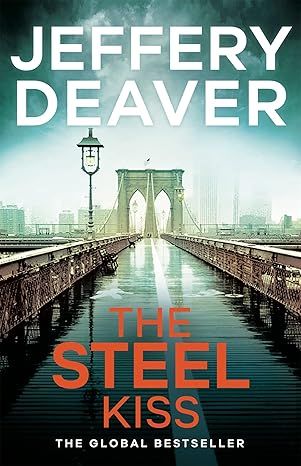
The Steel Kiss: Lincoln Rhyme Book 12 (Lincoln Rhyme Thrillers)
4.3
-
15,078
$2.55
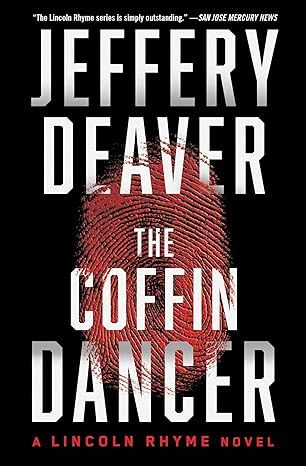
The Coffin Dancer: A Novel (2) (Lincoln Rhyme Novel)
4.5
-
5,617
$1.31
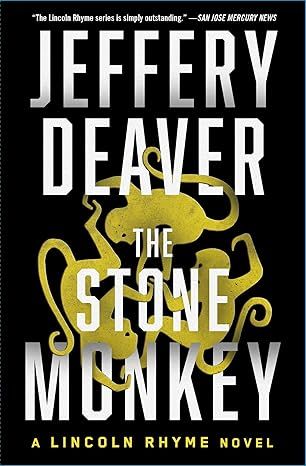
The Stone Monkey: A Lincoln Rhyme Novel (4)
4.5
-
4,802
$1.24
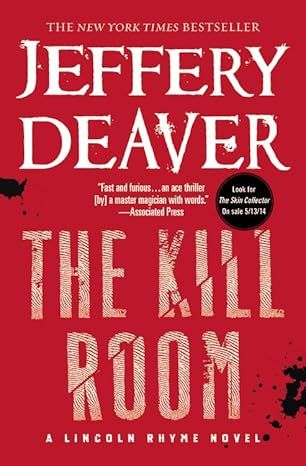
The Kill Room (Lincoln Rhyme)
4.3
-
6,193
$5.29
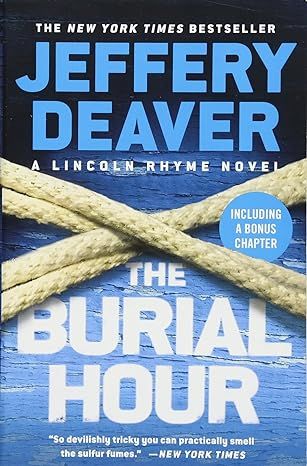
The Burial Hour (A Lincoln Rhyme Novel, 14)
4.2
-
12,268
$9.99
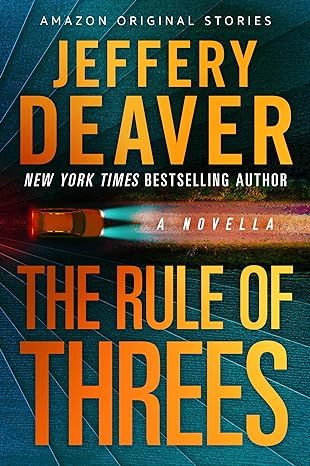
The Rule of Threes: A Novella
4
-
10,459
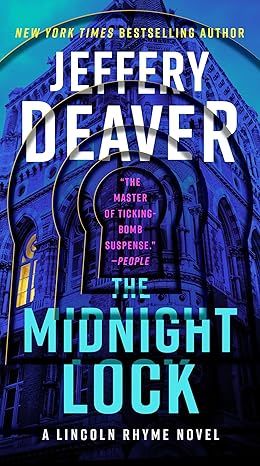
The Midnight Lock (Lincoln Rhyme Novel)
4.5
-
10,344
$2.05
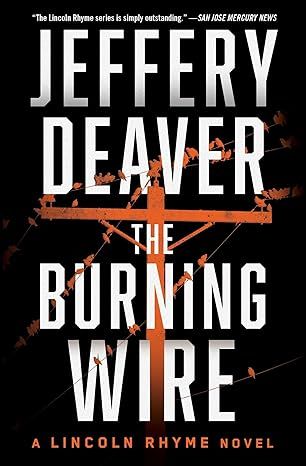
The Burning Wire (9) (Lincoln Rhyme Novel)
4.4
-
5,500
$3.99
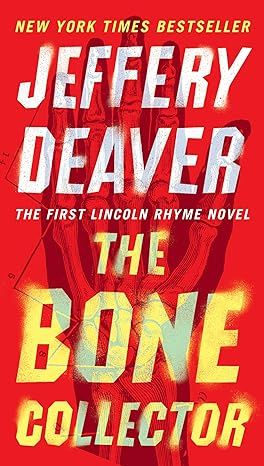
The Bone Collector (Lincoln Rhyme Novel)
4.5
-
7,183
$7.99
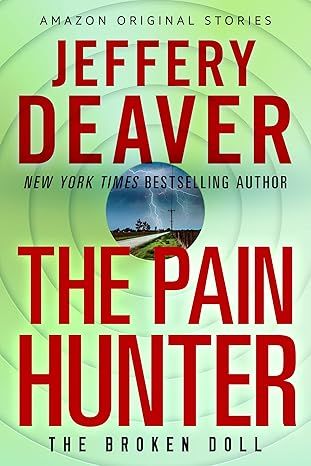
The Pain Hunter (The Broken Doll Book 1)
4.2
-
5,263
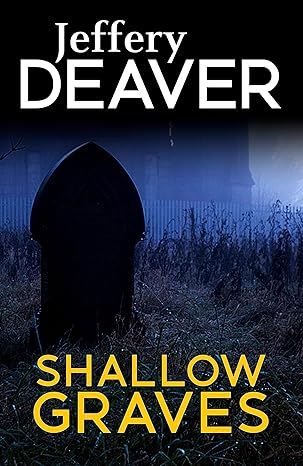
Shallow Graves
4
-
1,304
$3.82
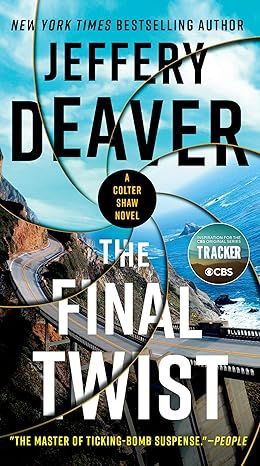
The Final Twist (A Colter Shaw Novel)
4.5
-
8,168
$1.97
Best Sellers

The Tuscan Child
4.2
-
100,022
$8.39

The Thursday Murder Club: A Novel (A Thursday Murder Club Mystery)
4.3
-
155,575
$6.33

Sapiens: A Brief History of Humankind
4.6
-
140,302
$13.49

The Butterfly Garden (The Collector, 1)
4.3
-
88,556
$9.59

Things We Hide from the Light (Knockemout Series, 2)
4.4
-
94,890
$11.66

The Last Thing He Told Me: A Novel
4.3
-
154,085
$2.99

The Perfect Marriage: A Completely Gripping Psychological Suspense
4.3
-
143,196
$9.47

The Coworker
4.1
-
80,003
$13.48

First Lie Wins: A Novel (Random House Large Print)
4.3
-
54,062
$14.99

Mile High (Windy City Series Book 1)
4.4
-
59,745
$16.19

Layla
4.2
-
107,613
$8.99

The Locked Door
4.4
-
94,673
$8.53
